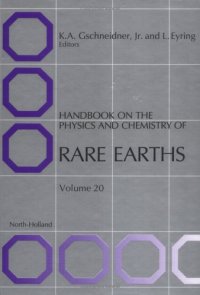
Ebook: Handbook on the Physics and Chemistry of Rare Earths
Author: Jeffrey M. Lemm, Leroy Eyring, Karl A. Gschneidner
- Genre: Physics
- Year: 1995
- Publisher: North Holland
- Language: English
- pdf
Chapter one deals with the Fermi surfaces of rare earth (Y, La, Ce, Pr, Nd, Sm, Gd and Yb) intermetallic compounds. It begins with an introduction to the relevant theories required to describe the electrons near the Fermi surface and then to the basic experimental techniques to study these surfaces. The main portion of the chapter is devoted to a comparison of the experimental results with the band structure calculations for a large number of compounds. Chapter two examines the world of thin films of rare earth metals, alloys and compounds. The three main topics covered are the pure metals themselves, metallic alloys and compounds, and metalloid compounds. The next chapter is devoted to hydrogen in metals and their binary compounds RH2 and RH3. One of the critical problems is the purity of the starting rare earth metal itself because phase relations can be greatly affected by impurities and attention is therefore paid to the preparation of specimens and the phase diagrams. Structural properties, kinetics and thermodynamic behavior, as well as electronic, magnetic and thermal properties are reviewed as well. Also examined is the profound influence of hydrogen on the magnetic properties by the mediation of RKKY interaction in these materials. The final chapter is an update on the magnetic behaviors of lanthanide intermetallic compounds, an area which has seen many new developments in the last 15 years. The chapter is divided into two main parts. Part one is devoted to 3d magnetism where both the 3d metal and lanthanide element contribute to the magnetic behavior, and the second part is concerned with lanthanide magnetism itself.